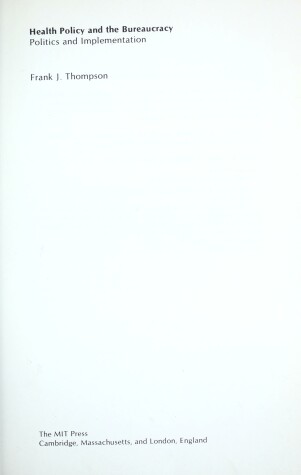American Politics and Public Policy
1 total work
"Health Policy and the Bureaucracy" serves political scientists as well as specialists in health policy and administration. It is first of all a unique, comprehensive analysis of the major federal health programs, tracing their impact from legislation through the various stages of implementation. And second, by exploring a cross section of federal action within a single policy arena, it provides insights into the processes and strategies of implementation itself.The author examines eight major programs representing three categories of federal intervention in the health arena: basic resource policies, medical service policies, and preventive policies.Basic resource policies are aimed primarily at shaping the supply and distribution of medical resources. The specific cases examined are the Hill-Burton program, the National Health Planning and Resources Development Act, the HMO program, and the National Health Service Corps.Medical service policies more explicitly involve the federal government in furnishing health services to various segments of the population. The book examines in considerable depth the successes and failures of Medicare, Medicaid, and the Veterans Administration medical network.Preventive policies seek to forestall injury, disease, and death by reducing health hazards in the environment (including the workplace) and by encouraging the modification of personal life-styles on a national scale. The much-opposed struggle to implement the Occupational Safety and Health Act receives primary consideration in the book's discussion of this sector of health policy.The focus is on the politics of implementation with respect to each policy. In particular, the book examines the varying abilities of the eight programs to avoid certain basic pitfalls. In each case, the founding statute is analyzed, followed by a discussion of the characteristics of the implementing agency, the supportiveness of the external political milieu, and the behavior of oversight actors, especially in their capacity as program fixers. The book stresses the role of statutes in rigging the implementation game; it raises a number of serious questions about the ability of oversight institutions to correct the problems that afflict health programs.Contents: Health as a Political Problem; Health Care Institutions: From Expansion to the Quest for Economy and Efficiency; Man-power Policy and Shortage Areas: The National Health Service Corps Evolves; Medicaid: A Commercial Market Strategy for the Poor; Medicare: The Perils of Payment with a Commercial Market Strategy; When Government Delivers Care: The Evolution of the VA Medical Programs; Preventive Health Policies: The Struggles of OSHA; Policy and Its Implementation: Clues from the Health Arena; Notes; Index.
